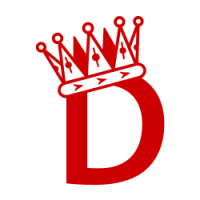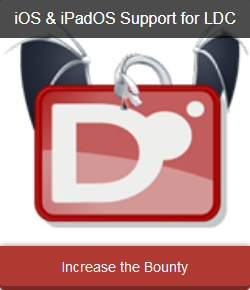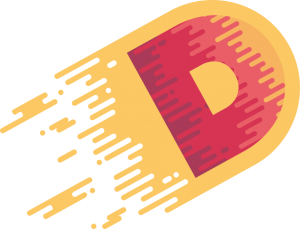Here are a few updates on things that have been going on both in front of and behind the scenes of the D Programming Language community.
New D Swag
We’ve got some new items in the DLang Swag Emporium: t-shirts, coffee mugs, and stickers sporting the Royal D logo. (If all Royal D items aren’t showing up for you in the Royal D category, check the D Rocket category. Everything should be in the correct location in a day or two).
You may notice that there are fewer options on the product page than for the other items, i.e. only one mug and sticker, and no dark tee option. They are available, though! When you select one of the existing products, you can change the style of the selection to one of several options. Beware! This may also change the price.
Remember, a small percentage of every item you order from the DLang Swag Emporium goes into the D Language Foundation’s General Fund. Plus, if you click through the link above or on the blog’s sidebar, we’ll get an additional referral fee on top of the item royalty. It’s an easy way to both get some D swag and contribute a few bucks to the Foundation.
Expanded Platform Progress
You maybe aware that some work has been ongoing in getting D onto more platforms. Adam Ruppe was working on contract to get LDC’s Android support to the finish line. He wrapped things up a few weeks back and has been paid out of the Foundation’s HR Fund.
Sebastiaan Koppe has been working on contract to get DRuntime ported to WebAssembly. Progress is ongoing and we currently expect it to be mostly wrapped up by the end of March. Like Adam, he’ll be out of the HR Fund when the contract is complete.
Work is also underway to bring LDC to iOS and iPadOS. We had been hoping to get someone to work on contract for this, but there are few people we know who are familiar enough with the platform to get it done and we were unable to find anyone then with the time to work on it. So we put up a bounty for it and kept our fingers crossed.
Recently, you may have seen forum posts from Jacob Carlborg indicating he’s been working on it in his spare time. Some preliminary support was merged in the LDC 1.20.0 release. Although he isn’t working under contract, he is working toward the bounty. That means anyone who wants to support him can contribute by increasing the bounty. Two contributors have already done so. The base amount of $3000 will be taken from the HR Fund when the work is complete.
And speaking of bounties, there are several others waiting for someone to claim them!
The HR Fund
With one payout from the fund and two coming up, we need to replenish it so we can always have cash earmarked for more contract work and bounties. You can make one-time or recurring donations of any amount directly and receive the same rewards available on our Open Collective page, or you can use a different link to make a $60 donation and get a DConf 2019 t-shirt in return. We’ve still got a few shirts available, so help us get rid of them and boost the HR Fund at the same time!
Documentation Event
Behind-the-scenes discussions about ideas to improve the D ecosystem in one way or another are frequently cycling through the inboxes of the people who can make them happen. Most never see the light of day, but there is one that has great potential. If it all comes together, I’ll be able to announce it in the coming weeks. We need your help to make that happen.
We need some specifics regarding areas where the documentation for D and items in the the D ecosystem is lacking. For example, people often complain about inconsistencies in the D spec, and missing info or examples in the DUB and vibe.d docs.
I’ve started a thread in the D forums where you can post your gripes about incomplete/missing/lackluster documentation. Remember, we need you to be specific. Just saying “the DUB docs are incomplete” doesn’t help. What specifically is missing? Or what specifically is wrong? The more information you can provide the better. And the more examples we can collect the better. The goal is to be able to define specific documentation tasks that anyone with the requisite knowledge can complete.
If we can get enough examples with enough detail, then I should be able to announce a new event sponsored by one of our generous benefactors. And I really want to be able to announce it!
DConf 2020
We really want to see a flood of talk submissions this year. If you’ve never been to DConf, or never presented at any conference, don’t let that stop you! Send us your submission and you may end up with a free trip to the conference.
Also, if you pay for an early-bird registration now (a 15% discount over the regular registration rate) and your talk is selected later, we’ll reimburse your registration fee. So if you’re planning to attend the conference even if your talk isn’t selected, it’s a good idea to register now and avoid the risk of missing the early-bird deadline.
We’re also offering once again the Open Source and Academic Discount; if you are a major open source contributor, a student, or an academic, we’ll give you a 50% discount on the regular registration rate. If you think you qualify, please don’t hesitate to take advantage of it by contacting social@dlang.org (or you can contact me directly at aldacron@gmail.com) for details on how to take advantage.
Finally, we never want to leave anyone out of DConf because they can’t afford to pay. This has been a policy of Walter’s from the beginning. If you are in or around London June 17 – 20 and would like to attend DConf but are unable to afford the registration and/or don’t qualify for the special discount, please email one of the addresses above and we’ll work something out.
 To kick off the year of double 20’s (or double X’s if you prefer), the D Language Foundation is excited to announce that
To kick off the year of double 20’s (or double X’s if you prefer), the D Language Foundation is excited to announce that 
 When Andrei Alexandrescu stepped down as deputy leader of the D programming language, I was asked to take over the role going forward. It’s needless to say, but I’ll say it anyway, that those are some pretty big shoes to fill.
When Andrei Alexandrescu stepped down as deputy leader of the D programming language, I was asked to take over the role going forward. It’s needless to say, but I’ll say it anyway, that those are some pretty big shoes to fill. When I first announced
When I first announced 
 Last Sunday, August 18, was the deadline for
Last Sunday, August 18, was the deadline for  In 2013,
In 2013,  It’s been quite a long time coming, but I’ve finally gotten around to setting up a storefront where folks can purchase D swag and support the D Language Foundation at the same time. You can now head over to the
It’s been quite a long time coming, but I’ve finally gotten around to setting up a storefront where folks can purchase D swag and support the D Language Foundation at the same time. You can now head over to the 